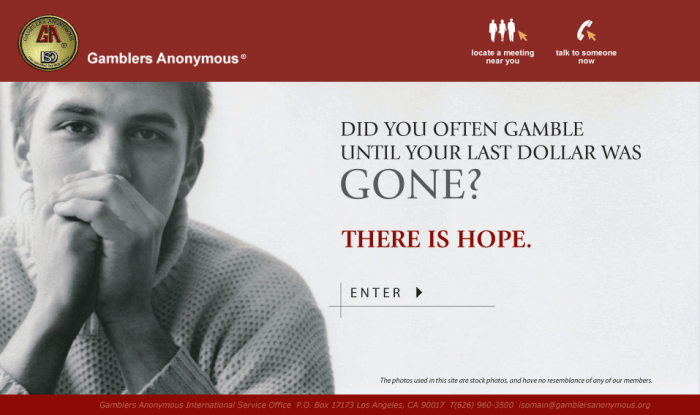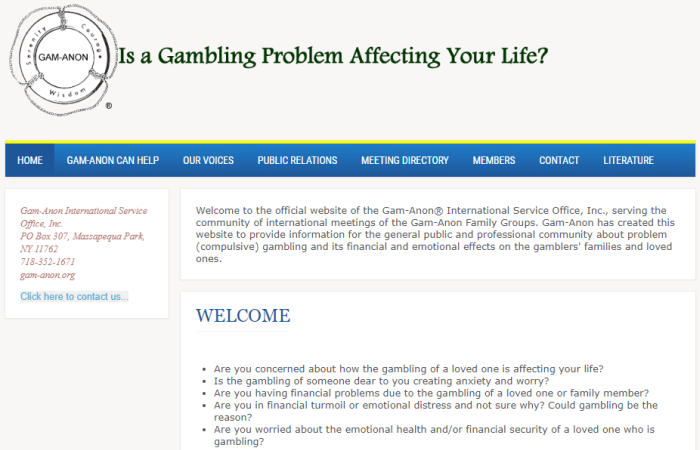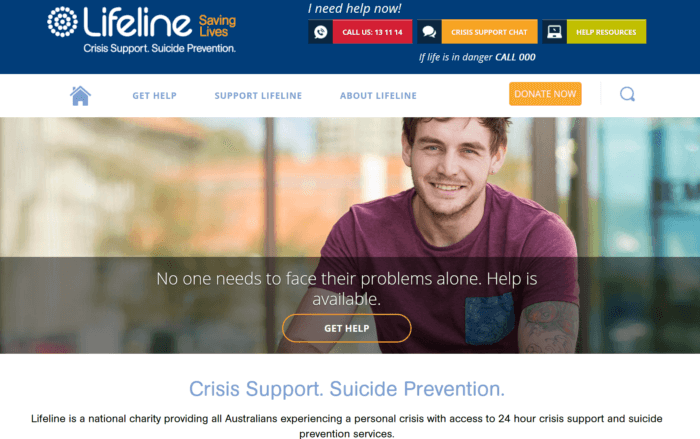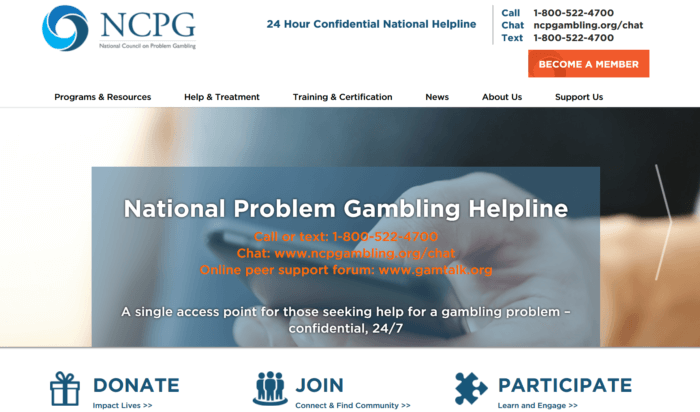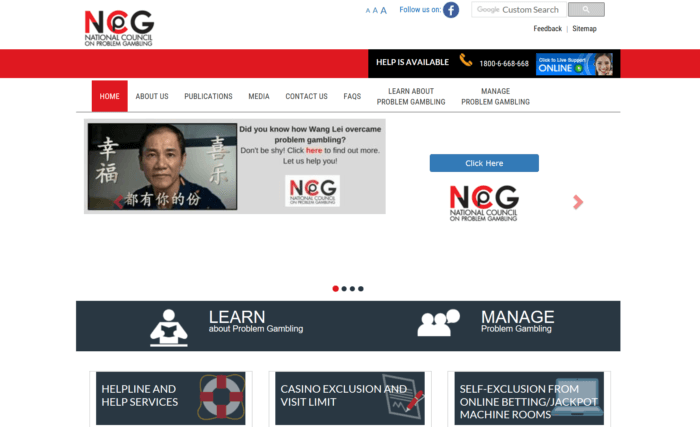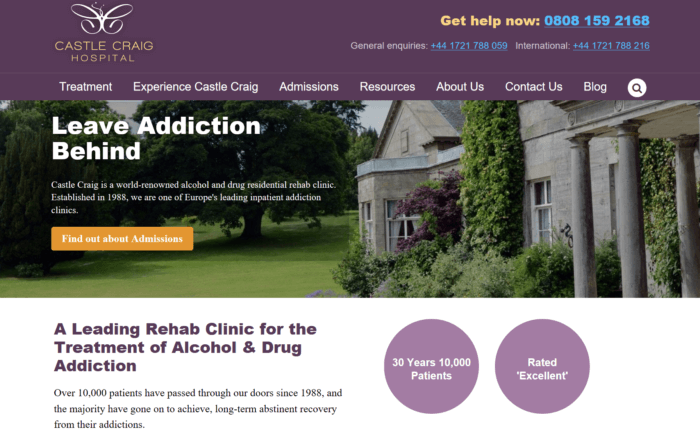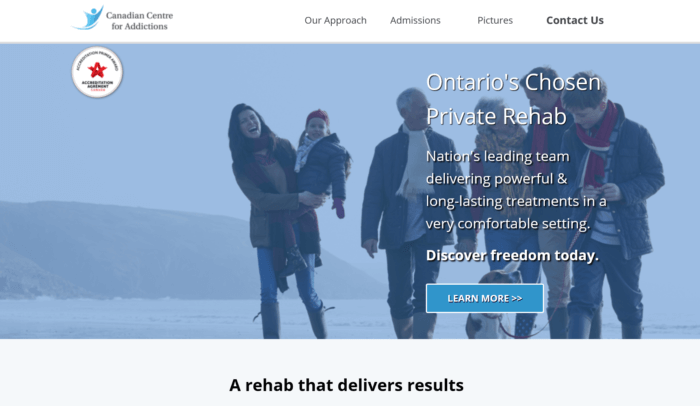Gambling & Lottery Addiction: You Have the Strength to Quit
Playing lotteries, poker, slots, and other games of chance may be a fun pastime for some people. Casual gambling can kill time and be forgetten at the end of the day. For others, it can have more severe undertones.
Gambling addiction is a very serious problem—one that can ruin lives if not corrected quickly.
What Is Gambling Addiction?
The Center on Addiction defines addiction as a complex and often chronic disease that “affects the functioning of the brain and body.” Lack of impulse control is the defining symptom of any type of addiction. Gambling disorder—another term for gambling addiction—is no different.
Compulsive gambling is very different from casual gambling. Pathological gamblers feel an irresistible urge to gamble, despite whatever toll it takes on their lives. According to the current Diagnostic and Statistical Manual of Mental Disorders (DSM), gambling disorder is a psychiatric condition and a type of behavioral addiction.
Like any severe addiction, gambling disorder can strain and may eventually damage personal and professional relationships beyond repair—but that's not the full extent of the wreckage it can leave in its wake. The Mayo Clinic explains that gambling can stimulate the brain’s reward system the way alcohol or drugs do. And as addicts are always chasing after the next “reward” or the next “high”, the financial health of compulsive gamblers at constant risk.
Gambling addicts are particularly prone to burning through their savings and burying themselves in debt. This type of addiction isn't just hard on the brain and body, but also on the wallet. The house, as they say, always wins—doubly so when compulsive gambling is concerned!
But is it really that big of a problem? Let’s check out some recent facts and figures.
Gambling Addiction Statistics
- 48 U.S. states allow legalized gambling in some form. It is prohibited in Hawaii and Utah. 85% of the country's adult population has tried gambling at least once.
- Nevada is the most gambling-addicted U.S. state, according to a 2018 analysis by WalletHub. Not surprisingly, gambling addiction is more prevalent in areas where gambling is a large part of the local culture.
- About 2 million adults or 1% of the adult population may be classified as pathological gamblers in a given year. This is according to the National Council on Problem Gambling (NCPG).
- Another 4-6 million adults or 2-3% of the population can be called problem gamblers. The NCPG defines problem gamblers as those not meeting the full set of criteria for gambling addiction but still experiencing difficulties due to the habit. However, many use the terms problem gambling, pathological gambling and compulsive gambling interchangeably.
- Around 40% of problem gamblers start the habit before turning 17.
- Approximately 500,000 teens across the nation are estimated to fit the definition of a problem gambler.
- Over 20% of compulsive gamblers in the U.S. eventually file for bankruptcy due to debts and losses.
- 61% of the poorest Americans are among the biggest lottery gamblers each year.
- 1 out of 5 pathological gamblers goes through with a suicide attempt. This is the highest rate observed among all addictive disorders.
- On a positive note, around 95% of the population is capable of being responsible gamblers.
Gambling Addiction Myths Debunked
There’s a lot of misunderstanding when it comes to gambling addiction. Statistics help paint a more accurate picture of the problem, but it's also important to separate deep-seated myths from facts.
For example, did you know that anyone can develop a gambling addiction? It doesn’t matter how old someone is or what their lifestyle is like. When gambling starts to have a negative impact on their life, it becomes a problem.
Let’s debunk more myths:
| Myths | Facts |
| Casinos, lotteries and other forms of gambling are the root causes of gambling addiction. | While casinos do their best to keep people playing, gambling games are not, in and of themselves, the cause of addiction. It still boils down to an individual’s inability to control their urge to gamble. |
| Only irresponsible or weak-willed people are prone to developing gambling problems. | Gambling addiction doesn't pick and choose, as we mentioned above. A strong sense of responsibility does not make someone immune. External factors, like job-related stress or relationship problems, may cause changes in behavior. |
| Gambling addiction is not a problem if a person can afford it. | Gambling addiction doesn’t just lead to financial ruin. It can also lead to job loss and career derailment, affect interpersonal relationships, cause mental health problems, and even drive someone to commit suicide. It is not about the loss of money, but about the loss of control. |
| You can help a gambling addict by helping them through their financial problems (i.e. paying off their debts). | Paying off a compulsive gambler’s debts sends the message that you are there as a financial safety net. Instead of solving the problem, it will only enable them and may encourage them to gamble more. |
Can Gambling Addiction Be Prevented?
Preventing gambling addiction is challenging. In fact, it may not be possible in most cases. Limiting exposure may work but it must be remembered that gambling will always be a part of modern society.
If you or someone you know has a lottery gambling problem, for instance, you’ll find it especially difficult to limit exposure. It is, after all, one of the most ubiquitous forms of gambling. It’s present in local convenience stores, shown on TV, and even has a place in newspapers. With the prevalence of online lottery sites, even the Internet isn’t safe for lottery gamblers trying to cut down on the habit.
What to Do: How to Deal with Gambling Addiction
The best thing that can be done in most cases is to recognize that the problem exists. If you suspect that someone you care about could be a problem or compulsive gambler, you may want to stage an intervention. While it’s most effective during the earliest signs of problem gambling, intervention at any stage is encouraged.
Why? Shining a light on gambling addiction and showing that you care is important. People can be unaware of their addiction, and even if they are, they may be in denial. It is estimated that over 80% of gambling addicts never seek treatment.
Do you have a sinking feeling that you may have a gambling addiction? Read on and see if your habits match the symptoms listed below. Remember: it’s never too late to seek help.
Symptoms: How to Spot a Gambling Addict
We'll say it again: Compulsive gamblers may not realize that they are addicts. Allowing someone to figure it out on their own is not a good idea. By the time they are ready to admit their addiction, it may be too late (i.e. they may already be deep in debt).
If you or someone you know has exhibited at least four of the following symptoms in the past year, then it’s highly likely that you're looking at a gambling disorder.
- Spending an increasing amount of money—and time—to get the desired “high” or that feeling of excitement one gets from gambling.
- Being too preoccupied with thoughts of gambling (i.e. analyzing past games, exploring ways to “game the system”, making future gambling plans, etc.).
- Being restless when forced to cut down on gambling.
- Feeling guilty about gambling.
- Lying to hide gambling activities.
- Using gambling as an go-to form of escape when stressed or distressed.
- Frequently trying to recoup losses—even at the cost of debt.
- Relying on others to help with financial problems caused by gambling.
- Continuing to gamble even at the risk of losing a job, a relationship, educational opportunity and the like.
Still not sure if what you're assessing can be called compulsive gambling? Additional knowledge may help. Let's take a closer look at the kinds of pathological gambling, as well as the typical trajectory of a developing gambling addiction.
What Are the Types of Gambling Addiction?
According to ADT Healthcare, an international addiction treatment provider, there are different types of gambling addicts.
- Normal Compulsive Gambler: These are the ones that start gambling socially but end up getting addicted. Normal compulsive gamblers are typically those that feel they need to win lost money back, so they begin to gamble a little too often. Before they know it, they’ve developed a gambling problem.
- Emotional Compulsive Gambler: This type is the most common one. Like alcoholics drowning their sorrows, emotional compulsive gamblers use gambling as a form of escape, usually from a traumatic event. Because gambling is considered as a mood-modifier, it becomes this type of gambler's form of self-medication.
- Biologically Pre-disposed Compulsive Gambler: Some have neurophysiological deficiencies that put them at risk of developing an addiction to gambling. Usually, these are people that are easily bored and are more inclined to be impulsive. They constantly feel the need to be stimulated, and gambling provides them with the perfect avenue for that.
It is important to note that this differentiation is not meant to divide gambling addicts into different degrees of severity. Rather, it's a way to offer insight on why they became addicted in the first place and can serve as a template to identify gambling addicts.
Let's say you've recognized the symptoms and identified the path a gambling addict is careening down. What comes next is figuring out where the compulsive gambler is on that path, as this will inform the way the situation is addressed.
What Are the Different Phases of Compulsive Gambling?
- Winning Phase: Gambling problems usually stem from big wins. This is where it starts. A seed of psychological excitement may eventually grow into a preoccupation with gambling.
- Losing Phase: This is where gambling starts to take over a person's life. They attempt to win back losses at all costs. They start to rack up debts. They may lie to family and friends about their gambling activities. They may also start to become more restless and/or withdrawn.
- Desperation Phase: This is where things become ugly. During this phase, compulsive gamblers are likely to do whatever it takes—not only lie, but cheat and even steal—to get more money to feed their addiction. Note that they may go through with these things even if the actions start to conflict with their own values. This is also the part where gambling addicts could develop suicidal thoughts.
- Hopelessness Phase: This is where compulsive gamblers start to lose their support systems, and the feeling of isolation becomes more pronounced. The more burned out they get, the more likely they are to develop substance abuse problems and experience an increase in suicidal thoughts.
As we mentioned above, intervention and seeking help are encouraged at any phase—but will likely be more effective the earlier it happens.
Gambling Addiction Treatment Providers
Like any other form of addiction, treating compulsive gambling starts when an addict recognizes their problem. Admittance is key! All too often, if you try to help an addict without them acknowledging they need help, you will be met with resistance. As cliché and corny as it sounds, true healing starts from within.
If you are planning a gambling intervention for someone else, part of the preparation calls for having one or several treatment plans ready for the compulsive gambler's consideration. Some may choose to have a professional interventionist facilitate the event. The resources below will help you through this process.
If you think you are a compulsive gambler and you've read this far: Congratulations! You are on the right track. When you’re ready to get proper help, you can check out the following avenues of treatment.
Gamblers Anonymous
This non-profit and self-supporting organization, like others similarly named, is a fellowship built on mutual aid and understanding. There are no membership fees or monthly dues needed in order to join Gamblers Anonymous. All that's needed is the desire to get better and stop gambling. Gamblers Anonymous offers a 12-Step program and holds meetings in numerous locations in the U.S. and all over the world.
If you are a compulsive gambler ready to seek help, you can visit the Gamblers Anonymous website and search for a meeting in your location. You can also start with calling one of their helplines.
If you need to get in touch with the Gamblers Anonymous International Service Office, you can reach them here:
- Phone: (626) 960-3500
- Fax: (626) 960-3501
- Postal Address: PO Box 17173, Los Angeles, CA 90017
Gam-Anon
What is sometimes overlooked in cases of gambling addiction is what happens to the friends and family of compulsive gamblers. Compulsive gambling damages professional and personal relationships; but this is often discussed and dealt with from the perspective of the addict.
Gam-Anon is similar to Gamblers Anonymous, but for people who have been and continue to be affected by another person's gambling addiction. There is a 12-Step program, and meetings in various locations.
Living with the effects of a gambling addiction of a loved one? Gam-Anon understands that this situation can be too much to bear alone. Seek help and support by checking out the official website for meeting locations in your area, or contact the organization directly:
- Email: [email protected]
- Phone: (718) 352-1671
- Postal Address: PO Box 307 Massapequa Park, NY 11762
ADT Healthcare
Billed as an international addiction treatment provider, ADT Healthcare specializes in treating a wide range of addictions and related mental health problems. They help people of all ages recover from alcoholism, drug addiction, compulsive gambling, gaming addiction, and more.
They work closely with various rehab centers, so they can properly match people with the right treatment they need. ADT partners with clinics in the UK, Ireland, US, UAE (Dubai), Mauritius, Switzerland, Spain, Portugal, Netherlands, Thailand and South Africa. Their other services include:
- Pre-assessment
- Treatment planning
- Intervention
- Rehabilitation advice
- Aftercare
If you need help, you can connect with them via live chat, or you can email them at [email protected]. Alternatively, you can request a call back. You can also reach them via the following numbers:
- Local: 0800-088-66-86
- International: +44 330 333 6197
Lifeline
Compulsive gambling, if left unchecked for too long, could lead to suicide. Lifeline’s main mission is to help bring people back from the brink. They are a national charity offering 24/7 crisis support and suicide prevention services to people living in Australia. They help anyone experiencing:
- Anxiety
- Abuse and/or trauma
- Addiction
- Depression
- Family problems
- Panic attacks
- Personal crisis
- Relationship problems
- Suicidal ideations
- Work problems
- Stress
- Substance abuse
They offer tons of helpful resources, and you can contact them via 24/7 live chat. You can also call them via the following numbers:
- Gambling helpline: 1800 858 858
- Emergency number: 000
- Phone: 13 11 14
If you need to get in touch with Lifeline’s national office, you can reach them here:
- Phone: (02)6215-9400
- Fax: (02)6215-9401
- Postal Address: PO Box 173, Deakin ACT 2600
NCPG
The National Council on Problem Gambling functions as an advocate for problem gamblers and their families in the US. In addition, they also provide free, confidential helplines and valuable resources. NCPG offers:
- Free 24/7 helplines
- Directory of help resources by State
- Directory of Inpatient, Residential and Intensive Outpatient treatment facilities
- Directory of certified counselors
You can contact NCPG via the following channels:
- Phone/Text: 1-800-522-4700
- Live Chat: ncpgambling.org/chat
NCPG Singapore
Singapore’s National Council on Problem Gambling offers various tools and resources to help curb or treat gambling addiction. Their services aren’t as comprehensive as their US counterpart, but the tools they offer are valuable nonetheless.
If you live there and need some help, you can contact them via live chat, or by calling the following number:
- Phone: 1800 6 668 668
They also allow you to apply for Casino Exclusions and Visit limits. If you apply for a Casino Exclusion, it means that you will be prohibited from entering casinos in Singapore. If you apply for a Visit Limit, your visits to casinos in Singapore will be limited per month. Additionally, you can also self-exclude from online betting games and jackpot machine rooms found in private clubs.
Castle Craig Rehab
Lottery addicts in the UK can turn to Castle Craig Rehab. Established in 1988, Castle Craig is one of the most established rehab centers that treat people suffering from a range of addictions. Their treatment expertise includes:
- Alcohol addiction
- Anxiety
- Bereavement
- Burn-out
- Depression
- Drug addiction
- Eating disorders
- Gambling addiction
- PTSD & trauma
- Prescription medications abuse
- Sexual compulsivity
- Stress
If you need help, you can reach them via the following channels:
- UK only: 0808-278-8161
- International: +44 1721 788 352
- General inquiries: +44 1721 788 103
- Fax: +44 (0)1721 752662
- Email: [email protected]
If you’d rather visit them in person, Castle Craig is located at Blyth Bridge, West Linton, Peeblesshire, Scotland, UK.
Canadian Centre for Addictions
The Canadian Centre for Addictions is a residential treatment facility in Toronto, Canada. They offer treatment programs for people suffering with various drug addictions, alcoholism, and compulsive gambling. Their programs include:
- Individual Addiction Counseling
- Group Counseling
- Outpatient Addiction Treatment
- Intervention
- Extended Aftercare Services
- Inpatient Rehab
You can reach the head office of the Canadian Centre for Addictions here:
- Phone: 1-855-906-3771
- Address: 20 De Boers Drive, Suite 208, North York, ON M3J0H1
To connect with their inpatient facility, you can reach them here:
- Phone: 1-905-800-1171
- Address: 175 Dorset St West, Port Hope, ON L1A 1G4
More Gambling Helplines
Didn't find what you needed above? Here are more gambling addiction helplines you can call for more advice, aid and information.
Australia (via Gamblers Anonymous Australia)
- ACT/NSW: (02) 9726 6625
- QLD/NT: 0467 655 799
- SA: (08) 8212 6933
- TAS: 0431 965 974
- VIC: (03) 9696 6108
- WA: (08) 9487 0688
Canada (via Canada Safety Council)
- Alberta Alcohol and Drug Abuse Commission
- British Columbia Problem Gambling Information and Referral Service
- Manitoba Gambling Helpline
- New Brunswick Problem Gamblers Hotline
- Newfoundland and Labrador Helpline
- Nova Scotia Toll-Free Gambling Helpline
- Nunavut Kamatsiaqtut Helpline
- Ontario Problem Gambling Helpline
- Prince Edward Island Gambling Addiction Treatment Program
United States (via Gamblers Anonymous)
- Alabama
- Birmingham: (205) 824-2473
- Montgomery: (334) 399-6918
- Arizona
- Spanish hotline: (888) 665-8346
- Phoenix: (602) 266-9784
- Tucson: (520) 570-7879
- California
- Palm Springs: (760) 325-2808
- Rest of California: 855-222-5542
- Colorado: 855-222-5542
- Connecticut: 855-222-5542
- Delaware Valley Intergroup: 855-222-5542
- In most US States: 855-2CALLGA (855-222-5542)
United Kingdom (via Gambling Commission UK)
- National Gambling Helpline: 0808 8020133
